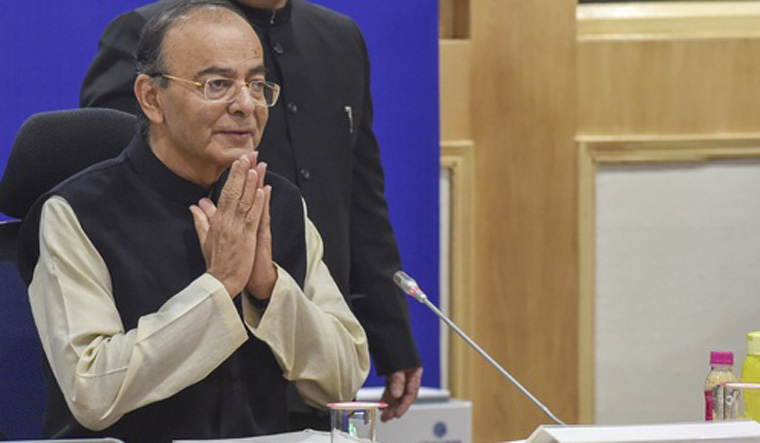The decisions of the 31st GST Council will make shopping and hanging out easier on the wallet. The council, on Saturday, decided to cut tax rates of 34 items. The cuts will come into effect from January 1.
"In today's meeting it was decided to remove six out of 34 items from the 28 per cent tax rate slab," said Arun Jaitley, Union finance minister and chairman of the GST Council, after the GST Council meet on Saturday.
"28 (items) are still left (under the tax slab). Most of these are either sin goods or luxury items," said Jaitley. He said the council, in its next meeting, will also take a decision on lowering GST rates on real estate purchases.
The meeting of the GST Council, which lasted for six hours, was attended by finance ministers from all states. During the meeting, the council reduced tax rates of 33 items from 18 per cent to 12 per cent and 5 per cent.
Among these was the GST levied on economy and business class pilgrims. The council reduced the 18 per cent tax on tickets of pilgrims on special flights to 12 per cent and 5 per cent, for business and economy class respectively.
Some goods that were earlier considered luxury items were removed from the category and their rates lowered. These include several motor vehicle parts, video games and even lithium power banks—all of which were taxed at 28 per cent earlier, but brought down to 18 per cent now.
Movie going will be cheaper from next year as the finance minister announced that GST on movie tickets costing up to Rs 100 was cut to 12 per cent from 18 per cent, while tickets over Rs 100 will attract 18 per cent tax, against 28 per cent earlier.
GST charges on services provided by banks to savings account holders too have been exempted from GST, along with taxes paid on IIMs course fees.
Prime Minister Narendra Modi had earlier said the government eventually wants to bring GST on 99 per cent of goods and services under 18 per cent. When GST was introduced in July 2017, there were approximately 270 items under the highest tax rate of 28 per cent.
Also Read
- GST collections hit Rs 1.78 lakh crore in March, second highest since roll-out
- GST enforcement body begins action against FMCG majors like ITC, Pepsico and others for tax evasion
- GST collections rise to second highest-ever at Rs 1.72 lakh crore in January
- GST officers detect over 29,000 bogus firms involved in fake ITC caims of Rs 44,000 crore
- E-way bill generation without B2B e-invoice details to be blocked from March 1
Air conditioners, however, were refused exemption from the 28 per cent tax rate as the council was divided on if these were purchased and used by the 'common man'.
The council has also decided to form a seven-member ministerial panel to look into the issue of lesser revenue collections by some states. The council approved formation of a seven-member group of ministers to study the revenue trend and analyse the reasons for lower revenue collection in these states.
"The study would include the underlying reasons for deviation from the revenue collection targets vis-a-vis original assumptions discussed during the design of GST system, its implementation and related
structural issues," a GST Council statement read.
The group of ministers, whose names are yet to be announced, will be assisted by a committee of experts from the Union government, state governments and Union finance ministry institute NIPFP (National Institute of Public Finance and Planning).
Jaitley, however, exuded confidence on the GST revenue collection trends and said consumer and producer states West Bengal and Maharashtra have both benefited after GST. "The benefits were not so much evident after the first year as they are in the second year of GST," Jaitley said.
The council, in its next meeting, will take up the proposals of extending the benefits of 1 per cent GST under its Composition Scheme to small service providers, and decide on tax rate on lotteries. It will also review taxation of residential real estate and threshold limit of exemption from GST for MSMEs.
The minister gave clear indications that the tax reliefs will continue to come in the new year as well when the GST Council meets in January for the last time before the interim Union budget is announced.



